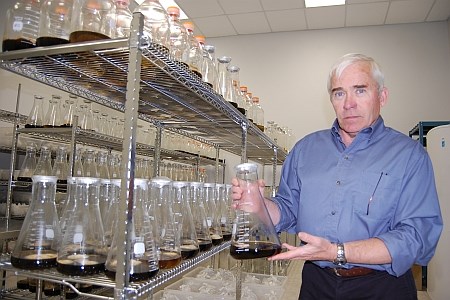Among the foothills of Chile's Andean mountain range lies the handiwork of Timmins environmental bio-tech firm Mikro-Tek, whose rapid tree growth project is turning it into a global carbon credit trader.
After undergoing rigorous inspection by international auditors, accountants and forestry experts, the company's proprietary forest management technology is now registered by the United Nations.
This makes Mikro-Tek the first Canadian company to meet the stringent Kyoto Protocol registration process for forestry projects, and just one of seven such small-scale forestry projects worldwide.
"It's been an awful lot of hard work, but we're proud of this designation," says Mark Kean, president of Mikro-Tek.
"This puts us in a good position for the future and the types of things we have planned."
The move now gives the company the official green light to trade carbon credits between countries that have ratified the Kyoto Protocol.
Through this system, credits are created through the reduction of greenhouse gases in developing countries, which in the case of Mikro-Tek is accomplished through the absorption of carbon by the trees they grow in places like Chile. These credits can then be sold to developed countries who need to meet emissions targets as part of a system to achieve a sort of global balance.
It's a process that's already begun, with Mikro-Tek regaining some of its initial investment costs by selling some of the credits produced through the Chilean project to various European states.
Since 1990, the company has studied the use of natural soil microbes, known as mycorrhizae, to enhance the speed of tree growth, applying them to forest seedlings prior to planting or through irrigation.
It's an effort with proven results: a three-year study done by the company with 10 million seedlings in the late 1990s showed average growth increases of 25 per cent. Re-examination of some of the trees since then has indicated the growth rate has held steady, and in some cases, has actually improved.
It's a proprietary technology Kean has used to help re-green mine tailings areas with the likes of Vale, Xstrata Nickel and Goldcorp.
This success is further enhanced in places like Chile, where trees naturally grow faster than in Canada due to a year-round growing season.
It's something that prompted the establishment of a branch office in the country. Through this, Kean reached out to a coalition of small-scale Chilean farmers who traditionally grow grapes and citrus fruits in areas where forests were cleared 100 years prior to make room for agricultural work.
In the back end of these lands, however, are non-productive hilly regions where farming is all but impossible due to the lack of any real irrigation.
With that, Mikro-Tek struck deals to reforest these clearings, with the farmers needing only to build fencing to protect the young trees from hungry cattle or roving mountain goats.
Back at the Timmins biotechnology facility, testing was conducted to adapt the soil bacteria from its traditional use in Boreal-forest environments to those in Chile. It has since been applied successfully to pine and eucalyptus growth projects in the area, providing UN approval and hope for the company.
Despite the positive results, using forestry projects as a basis for carbon credits has its own challenges. Unlike solar and windmill-driven projects, the amount of carbon credits generated by trees can be challenging to quantify. Trees absorb different amounts of carbon depending on their stage of growth, meaning projects such as those in Chile require updating and monitoring through satellite photography and site visits.
Unexpected events can also threaten the project, as Mikro-Tek discovered when an earthquake registering 6.8 on the Richter Scale shook the region in 2003. The loss of trees to disasters or weather means a smaller carbon capture and a reduction in credits, though a forester hired by the company found no damage, thereby preserving the integrity of the project.
"There are lots of checks and balances to the system," says Kean.
With its Chilean success and UN registration under its belt, the company's plan is now to begin using things like its proprietary C-Trade Carbon Pool to allow investors to put up money for projects. In return, they would obtain the financial equivalent of carbon credits spread over a set period of time, something Kean likens to a mutual fund.
Plans also include the expansion of projects both in Canada and abroad.




